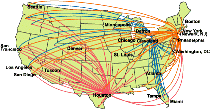United States Department of Transportation

United States Department of Transportation: Publications
Date of this Version
2002
Abstract
It is common that offshore operating and drilling companies have policies, procedures, and practices that address Health, Safety, and Environmental (HSE) issues. It is less likely that such organizations will explicitly address (through written requirements) human factors (HF) concerns. Regardless, both HSE and HF are concerned with the same objectives: protecting people, property, and the natural environment from damage. The methods of each examine the job performed by the human, and compare work requirements to the design of hardware, software, and paper systems to allow safe and efficient performance. The perspectives of both disciplines are generally “user-centered” and act as the advocates for the human user to influence design so that hazards are limited and efficient and productive human performance is afforded. In the end, both are cost-effective in that efficiency is enhanced, and production losses due to injury or equipment damage are avoided. Despite the similarities, HF, including ergonomics, is rarely comprehensively addressed by HSE policies, practices, procedures, and personnel. A problem exists in that, while most offshore operators have integrated HSE programs, portions of which include occupational health and safety and process safety management systems, few companies are sure how to integrate HF concerns. In particular, such companies are not sure what the role of HF (including organization concerns) should be if managed within the overall HSE management system (HSE MS).
The objective of this paper is to explore means whereby appropriate HF concerns can be effectively integrated and managed offshore. The context of the paper is the managed application of HF principles and methods within offshore operations, rather than a presentation of the details of HF data and methods, or of the mechanical aspects of associated HF analysis tools and processes.
During the 1996 International Workshop on HF in Offshore Operations, the Management Systems Working Group generated a paper titled: “Application and Integration of Human and Organizational Factors into Management Policies, Procedures, and Practices to Reduce Human Error and Improve Safety and Productivity” (Moore, et al., 1996). That paper presented extensive background material on the management objectives and activities for both HF and safety management. This present paper builds on that foundation and expands the scope from HF within process safety to HF within overall HSE management programs. This will be accomplished by:
· Summarizing the offshore HSE management and HF approaches and recommended practices
· Presenting a notional life cycle process of HSE management systems appropriate for offshore application
· Identifying potential HF participation in the HSE management development process, thereby integrating HF issues and concerns with overall HSE MS objectives and processes.


Comments
Proceedings of the 2nd International Workshop On Human Factors In Offshore Operations '02. Huston, Texas, April 8-10, 2002.